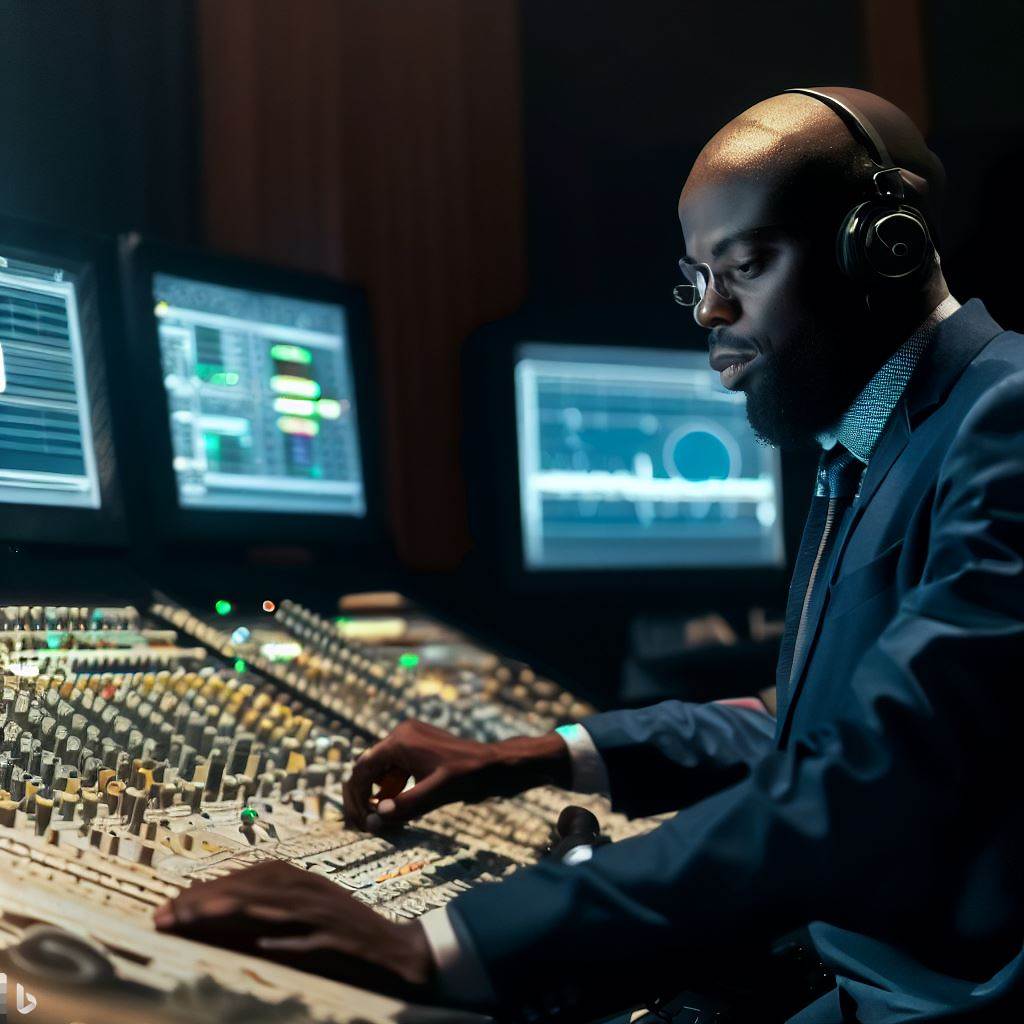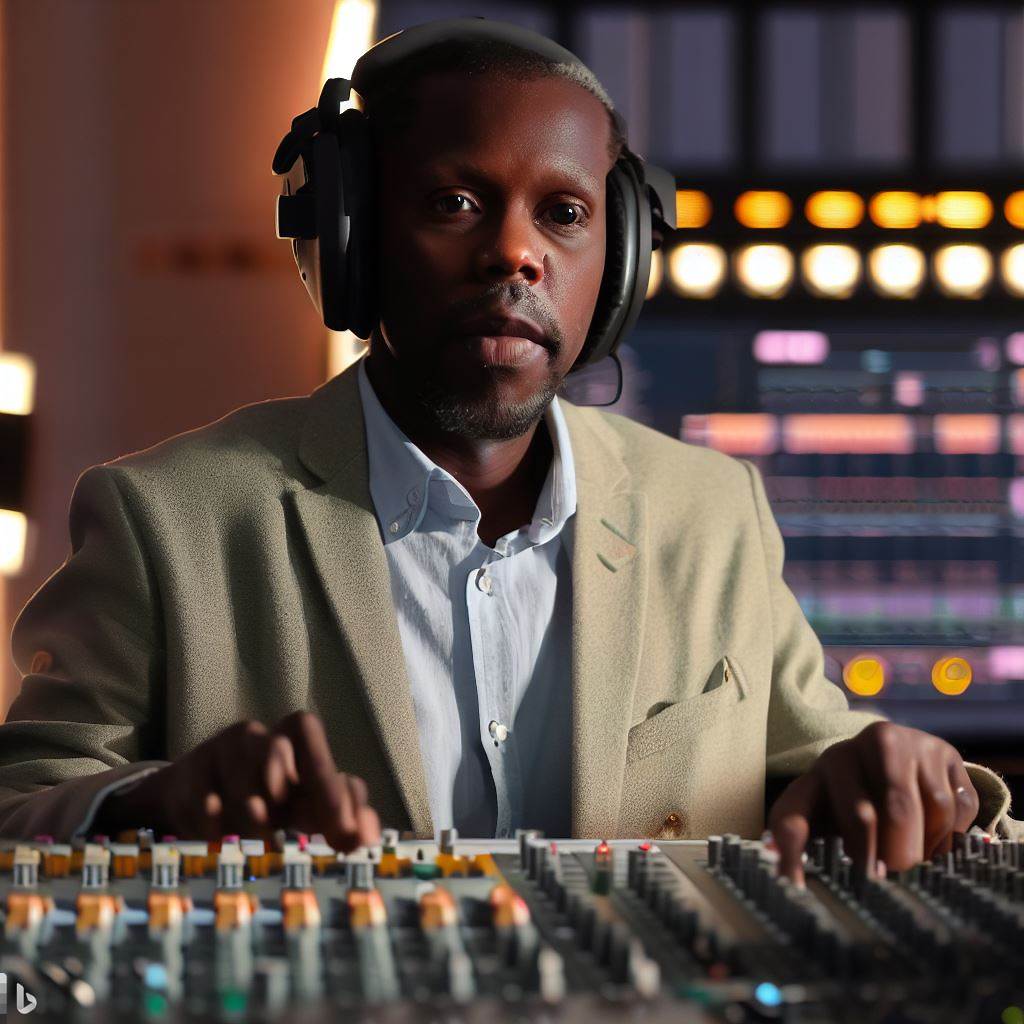Introduction
Mixing Engineer Contracts: Legal Aspects in the Nigerian Context
In the Nigerian context, understanding the role of a mixing engineer is crucial. A mixing engineer is responsible for blending audio elements and ensuring the quality of the final product.
Having a mixing engineer in the music industry is highly significant. They play a vital role in enhancing the overall sound and ensuring a polished final production.
A mixing engineer has diverse responsibilities that contribute to the success of a music project. They balance levels, edit tracks, apply effects, and bring out the desired sonic qualities.
Contracts for mixing engineers in Nigeria demand careful consideration of legal aspects. Both parties must clearly define their rights, obligations, and expectations.
To protect all parties involved, a mixing engineer contract should outline payment terms, project scope, intellectual property ownership, and dispute resolution mechanisms.
Nigerian music industry stakeholders should also consider copyright laws and licensing regulations when drafting mixing engineer contracts.
Negotiating and signing a comprehensive contract ensures a smooth working relationship between mixing engineers and their clients.
In the end, the role of a mixing engineer, the importance of their presence in the music industry, and their diverse responsibilities cannot be underestimated.
Understanding the legal aspects of mixing engineer contracts in Nigeria is vital to protect the rights and interests of all involved parties.
Overview of Contract Law in Nigeria
In Nigeria, contract law is governed by the common law system, which is derived from British colonial rule.
Contract law in Nigeria is mainly based on the principles of freedom of contract and the intention of the parties involved.
Key Elements of a Valid Contract
- Offer and Acceptance: A valid contract requires a clear offer by one party and an unqualified acceptance by the other.
- Intention to Create Legal Relations: Both parties must intend for their agreement to have legal consequences.
- Consideration: There must be something of value exchanged between the parties, such as money or services.
- Capacity: The parties involved in the contract must have the legal capacity to enter into a contract.
- Consent: The contract must be entered into voluntarily, without any coercion or fraud.
- Legal Object: The purpose of the contract must not be illegal or contrary to public policy.
These key elements are essential to ensuring the validity and enforceability of a contract in Nigeria.
Need for Written Agreements in the Music Industry
In the music industry, where collaborations and agreements are common, a written contract is highly recommended for various reasons:
- Clarity of Terms: A written agreement allows both parties to clearly understand their rights, obligations, and expectations.
- Evidence: A written contract serves as tangible evidence of the agreement in case of disputes or legal issues.
- Memory Aid: Music projects can be complex, and a written contract helps in remembering the specifics of the agreement.
- Protection of Rights: A written agreement helps to protect the rights of the parties involved, such as ownership of intellectual property.
- Professionalism: Having a written agreement portrays professionalism and seriousness in the music industry.
Without a written contract, misunderstandings and disagreements can arise, leading to disputes and potential financial losses.
Therefore, it is crucial for music professionals to draft and sign written agreements for their collaborations and projects.
Additionally, it is important to note that some agreements in the music industry, such as record deals or licensing agreements, may be subject to specific legal requirements, such as registration with applicable regulatory bodies or obtaining necessary licenses.
It is advisable to seek legal advice to ensure compliance with these requirements.
In fact, contract law in Nigeria is based on the common law system and requires key elements for a valid contract.
In the music industry, written agreements are highly recommended to ensure clarity, evidence, and protection of rights.
By adhering to these legal aspects, music professionals can avoid disputes and safeguard their interests in Nigeria’s vibrant music scene.
Read: A Day in the Life of a Performers’ Manager in Nigeria
Importance of Contracts for Mixing Engineers
In the world of music production, contracts hold a significant role in protecting the rights and interests of mixing engineers. Without a formal contract in place, both parties may face potential risks and disputes.
This section highlights the importance of contracts for mixing engineers, explores the typical contents of such contracts, and discusses the implications of not having a formal agreement.
1. Significance of Contracts
Contracts play a crucial role in safeguarding the rights and interests of mixing engineers. They provide a legal framework that outlines the terms and conditions of their engagement with clients.
By having a solid contract in place, mixing engineers can:
- Ensure payment and compensation: Contracts specify the agreed-upon fee, payment terms, and any additional compensation for revisions or extra work.
- Protect their intellectual property rights: By including clauses that address copyright, ownership, and usage rights, mixing engineers can safeguard their creative work.
- Establish clear deliverables: Contracts outline the specific services to be provided, including the number of revisions, vocal tuning, and any other audio enhancements.
- Set deadlines and timelines: Contracts help define project timelines, ensuring that both parties have a clear understanding of the expected delivery dates.
- Outline legal remedies: In case of breaches or issues, contracts provide a legal recourse for the parties involved, offering a foundation for dispute resolution.
2. Typical Contents of a Mixing Engineer Contract
A mixing engineer contract generally includes several key components that ensure a smooth and legally protected working relationship. These elements typically include:
- Parties involved: Clearly identifying the mixing engineer and the client, including legal names and contact information.
- Description of services: Outlining the scope of work, including specific tasks and responsibilities, such as mixing tracks, adjusting levels, and applying effects.
- Compensation and payment terms: Stating the agreed-upon fee, payment schedule, invoicing details, and any additional expenses that might be reimbursed.
- Intellectual property rights: Specifying who will own the final mixed tracks, determining usage rights, and addressing any potential royalties or residual payments.
- Confidentiality and non-disclosure: Ensuring the protection of sensitive information shared during the project, such as unreleased tracks or trade secrets.
- Term and termination: Defining the duration of the contract and the conditions under which either party can terminate the agreement.
- Dispute resolution: Outlining the process for settling any potential disputes, whether through negotiation, mediation, or legal proceedings.
3. Implications of Not Having a Formal Contract
The absence of a formal contract may expose mixing engineers to various risks and uncertainties. Without a written agreement, both parties may encounter the following implications:
- Payment disputes: Without a clear contract, the agreed compensation and payment terms may become a subject of disagreement between the mixing engineer and the client.
- Lack of creative control: Not having a formal agreement may lead to ambiguous expectations, resulting in the client requesting excessive revisions or changes without proper compensation.
- Ownership disputes: Without a contract, issues concerning the ownership and usage rights of the mixed tracks may arise, potentially causing legal conflicts.
- No legal protection: The absence of a contract leaves both parties vulnerable to potential breaches, as there is no legally binding document to reference in case of disputes.
- Incomplete or unsatisfactory work: Without a clear contract outlining deliverables and deadlines, the mixing engineer may face difficulties in managing the client’s expectations, leading to dissatisfaction.
To mitigate these risks and ensure a smooth working relationship, it is crucial for mixing engineers to have a well-drafted contract in place before commencing any projects.
In essence, contracts are of utmost importance for mixing engineers in the Nigerian context.
By clearly defining the terms, responsibilities, and expectations of the parties involved, contracts protect the rights and interests of mixing engineers while ensuring a mutually beneficial collaboration.
Read: Investigative Journalism in Nigeria: A Closer Look
Key Considerations for Mixing Engineer Contracts in Nigeria
In the Nigerian context, there are specific legal aspects that are relevant to mixing engineer contracts.
It is important for both parties involved to understand and consider these aspects to ensure a smooth working relationship. Here are some key considerations:
1. Copyright Ownership and Licensing
- Clarify who owns the copyright of the final mixed songs. This provision should be clearly stated in the contract.
- Ensure that the mixing engineer grants the necessary licenses to the artist or producer for the use and exploitation of the mixed songs.
- Specify any limitations or restrictions on the use of the mixed songs, such as geographical limitations or limitations to specific mediums (e.g., streaming platforms).
- Include provisions for royalties and revenue sharing in case the mixed songs generate income in the future.
2. Payment Terms and Compensation
- Clearly define the payment terms, including the amount and timing of payments.
- Consider whether the payment will be a one-time fee or if there will be additional payments for future use of the mixed songs.
- Include provisions for reimbursement of any expenses incurred by the mixing engineer during the project.
- Specify the consequences of late or non-payment, such as interest charges or termination of the contract.
3. Term of the Contract
- Specify the duration of the contract, including the start date and end date, or indicate that it is a project-based contract.
- Include provisions for contract renewal or extension, if desired by both parties.
- Outline any conditions or circumstances that may terminate the contract prematurely, such as breach of terms or non-performance.
4. Indemnification and Liability
- Include provisions for indemnification, which specifies that one party will compensate the other in case of any legal claims or disputes arising from the mixing engineer’s work.
- Define the limits of liability, ensuring that the mixing engineer will not be held responsible for any damages beyond their control or expertise.
- Consider including a dispute resolution clause, specifying the method and venue for resolving any disagreements between the parties.
By considering these key aspects, both parties can protect their legal rights and ensure a fair and mutually beneficial working relationship.
It is advisable to consult with legal professionals experienced in entertainment and contract law before finalizing any mixing engineer contracts in Nigeria.
Read: Influence of Nigerian Mixing Engineers on Global Music Scene

Uncover the Details: How to Enter Nigeria’s Circus Performance Industry
Drafting Effective Mixing Engineer Contracts in Nigeria
When hiring a mixing engineer in Nigeria, it is crucial to have a comprehensive and legally sound contract in place.
This blog section will provide practical tips for drafting such contracts, emphasizing the importance of clear terms and conditions.
Additionally, it will discuss the role of legal professionals in drafting and reviewing these contracts.
Tips for Drafting a Comprehensive and Legally Sound Mixing Engineer Contract
- Clearly define the scope of services the mixing engineer will provide, including the specific tasks and deliverables.
- Include a detailed payment structure, outlining the agreed-upon fees, deposit requirements, and any additional costs.
- Specify the project timeline, including start and end dates, as well as any important milestones or deadlines.
- Address ownership and intellectual property rights, clearly stating who will retain the rights to the finished product.
- Include provisions for potential revisions or changes to the project scope, outlining how additional work or modifications will be handled.
- Clearly state the terms of termination, including conditions under which either party may terminate the contract.
- Address confidentiality and non-disclosure agreements to protect sensitive information shared during the project.
- Include warranties and indemnification provisions to protect both parties from any potential breaches or disputes.
- Outline the dispute resolution process, including whether arbitration or litigation will be pursued in case of disagreement.
- Include a clause on governing law, specifying that Nigerian laws will govern the contract.
The Need for Clear Terms and Conditions
Clear and well-defined terms and conditions are essential in a mixing engineer contract to avoid misunderstandings and legal disputes.
By outlining precise responsibilities, expectations, and obligations, both parties can ensure a smooth working relationship.
These terms and conditions should cover all aspects of the project, from payment terms to responsibilities for equipment maintenance, to avoid any potential conflicts.
The Role of Legal Professionals
Engaging legal professionals in the drafting and reviewing process of a mixing engineer contract is highly recommended.
These professionals have the expertise to ensure that the contract adheres to Nigerian laws and regulations, providing legal protection for both the hiring party and the mixing engineer.
They can identify loopholes, address potential risks, and ensure that the terms are fair and balanced to all parties involved.
Legal professionals can also help in negotiations, ensuring that the contract reflects the best interests of their clients.
Their assistance can be invaluable in resolving conflicts, protecting intellectual property rights, and providing guidance on the overall legality of the contract.
In a nutshell, drafting effective mixing engineer contracts in Nigeria requires careful attention to detail and the inclusion of clear terms and conditions.
Hiring legal professionals can offer expert guidance in ensuring the contract’s compliance with Nigerian laws, protecting both parties involved.
By following these tips and seeking legal assistance, one can create a comprehensive and legally sound mixing engineer contract.
Read: How Nigerian Music Styles Influence Mixing Engineering Techniques
Dispute Resolution Mechanisms for Mixing Engineer Contracts in Nigeria
In Nigeria, there are various dispute resolution mechanisms available for handling conflicts that may arise in mixing engineer contracts. These mechanisms include arbitration, mediation, and litigation.
Each of them has its advantages and disadvantages, and it is important to carefully consider which option to include in the contract.
Additionally, it is crucial to include dispute resolution clauses to ensure a smooth and efficient resolution process.
1. Arbitration
- Arbitration is a commonly used method for resolving disputes in mixing engineer contracts in Nigeria.
- It involves referring the dispute to a neutral third party, known as the arbitrator, who makes a binding decision.
- The advantages of arbitration include confidentiality, flexibility, and the ability to choose an expert arbitrator familiar with the music industry.
- However, arbitration can be costly, and the decision reached may not always be favorable to both parties.
2. Mediation
- Mediation is another popular dispute resolution mechanism in Nigeria.
- It involves the parties voluntarily engaging a neutral mediator who facilitates discussions and helps them reach a mutually acceptable solution.
- The advantages of mediation include cost-effectiveness, informality, and the preservation of the relationship between the parties.
- However, the decision reached through mediation is non-binding, and there is a possibility of failure to reach an agreement.
3. Litigation
- Litigation refers to resolving a dispute through the court system in Nigeria.
- It involves presenting the case to a judge who makes a final judgment based on the evidence and applicable laws.
- The advantages of litigation include impartiality, the enforceability of court orders, and the ability to appeal the decision.
- However, litigation can be time-consuming, expensive, and may strain the relationship between the parties.
When including dispute resolution clauses in mixing engineer contracts, it is important to consider the specific needs and circumstances of the parties involved.
Such clauses should outline the preferred dispute resolution mechanism and provide guidelines for the process.
Benefits of including dispute resolution clauses
- They provide a clear roadmap for resolving disputes, reducing uncertainty and potential conflicts.
- They allow parties to choose the most suitable dispute resolution mechanism for their specific needs.
- They provide an opportunity for parties to amicably resolve conflicts, preserving their professional relationship.
- They can help save time and costs associated with lengthy litigation processes.
- They offer enforceability of decisions, ensuring compliance with the chosen resolution mechanism.
Basically, understanding the available dispute resolution mechanisms in Nigeria, such as arbitration, mediation, and litigation, is crucial for efficient problem-solving in mixing engineer contracts.
Including well-drafted dispute resolution clauses can contribute to a smoother and more effective resolution process.
Careful consideration of the advantages and disadvantages of each mechanism is vital in selecting the most appropriate one for the parties involved.
Conclusion
The legal aspects of mixing engineer contracts in the Nigerian context are crucial to understand for professionals in the industry. By summarizing the main points discussed in this blog post, it is evident that…
It is essential for mixing engineers to have a clear understanding of their rights and obligations within these contracts.
This knowledge can protect them from unfair business practices and ensure their work is properly compensated.
To navigate the complexities of these contracts, seeking legal advice is highly recommended.
By consulting with legal professionals experienced in the Nigerian music industry, mixing engineers can safeguard their rights and negotiate fair terms.
Understanding the legal aspects of mixing engineer contracts is paramount in the Nigerian context.
Mixing engineers should prioritize seeking legal advice to protect their rights, foster fair business practices, and thrive in their careers.




